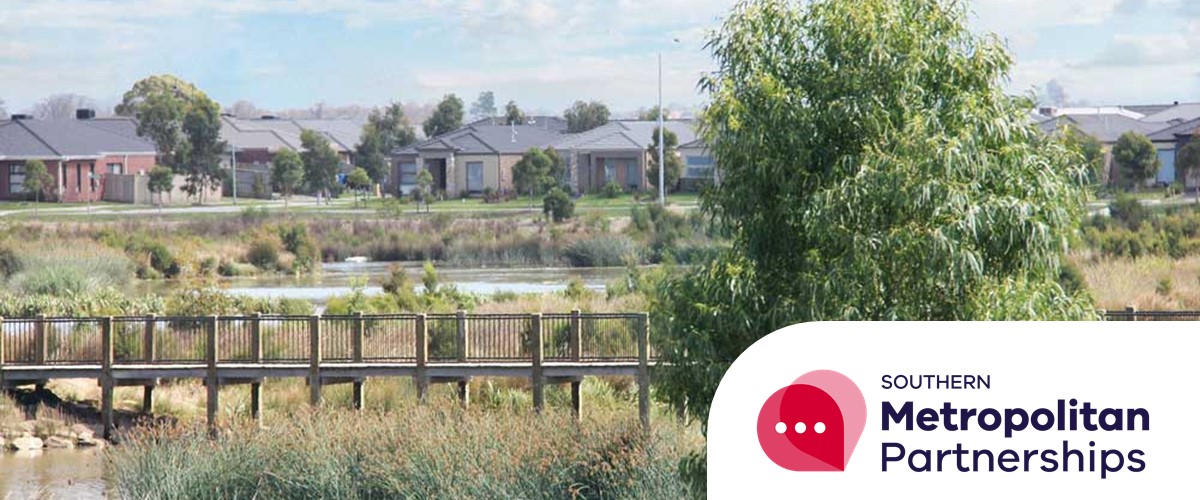The Southern Metropolitan Partnership ran from 2017 to 2024. The Partnership engaged with local communities to advise the Victorian Government on the key priorities for jobs, services and infrastructure.
Former Members
The Southern Partnership was made of community and business representatives with varied backgrounds, experiences and networks and the CEO of each participating local government.
Members of the Southern Metropolitan Partnership were:
- Elizabeth Deveny
- Andrew Gardiner
- Vicki MacDermid
- Jillian Walsh
- Andrew Cornwall
- Tracey Cooper
- Jacqueline Galloway
- Deborah Mallett
- George Halkias
- Shabnam Safa
- Andrew Simmons
- Gabrielle North-Harney
- Kathy Racunica
- Simon Whiteley
- Vonda Fenwick
What we've done
The Partnership invested in research and projects to further explore, and act upon, the priorities raised by the people of the west.
The projects were commissioned by the Metropolitan Partnerships Development Fund and the insights were shared with government to inform policies and programs.
This project sought to influence and inform government policy and investment in the southern region and lead to improved regional level coordination.
It delivered a range of benefits including aligned or integrated investment in new infrastructure projects between Southern councils and other levels of governments and the private sector. It facilitated more strategic and evidence-based decision making in designing flexible and innovative solutions, and ensure greater transparency, community voice and support for decision making in planning for the future of the region.
Outputs of project comprised of:
- A needs assessment and gap analysis of the region informed by data and existing work
- A set of evidence based, shared regional priorities
- An investment framework for the Southern region to inform government and non-government investment decisions in the region
This project sought to influence and inform government policy and investment in the southern region by providing an evidence base.
Delivery of this project was led by the City of Kingston with the support of Frankston City Council, City of Casey, Cardinia Shire Council, City of Dandenong, Mornington Peninsula Shire Council and the Victorian Government.
This project responded to the challenges of higher-than-average unemployment rates in the Southern metropolitan region and difficulties faced by employers in finding and retaining skilled staff.
It built on the highly successful Changing Perceptions in Employment pilot. It used established behaviour change frameworks in an audit of the Changing Perceptions in Employment pilot and undertook an assessment of its scalability.
The project then developed a prototype toolkit and trial scaling human-centred, place-based employment programs for lasting outcomes to the needs of the region.
Delivery of this project was led by BehaviourWorks Australia (Monash University) with input from the Department of Jobs, Precincts and Regions (Jobs Victoria programs) and the Department of Education.
The MPDF Round 3 project, led and delivered by Casey Council, aimed to help people under 25 years, over 45 years, and people from CALD communities, into work. The project targeted the manufacturing, allied health & community services, and hospitality & tourism industries because of their critical skills shortages.
The project concluded on 30 June 2022 and has been recognised by a range of stakeholders as exceeding targets and expectations, and a successful pilot project overall.
Using a person-centred wraparound approach, the project was able to match job seekers to jobs by building genuine relationships with employers, cultivating connections, offering more holistic referrals to job seekers, facilitating industry information sessions, providing access to training to upskill job seekers and facilitating access to employment.
Read the Changing Perceptions in Employment Final Report PDF, 2947.02 KB.
Outcomes of the project included:
- 53 job seekers were placed into employment
- 26 proactive employers engaged
- 317 jobseekers were referred to upskilling initiatives
- 109 job seekers completed training / short courses, comprising:
- 68 in hospitality and tourism
- 40 in manufacturing
- 1 in allied health and community services
As a result of the program, 53 local job seekers found employment within the City of Casey. Vimal, interviewed in the above video, was connected to employment at Amstel Golf Club in Cranbourne through the program.
Completed in 2021, the Southern Integrated Transport Framework (SITF) aims to improve public transport and reduce social isolation in the southern region by making short-term, practical proposals which contribute to long-term aspirations of efficiency, road space allocation, new active transport networks and station upgrades.
Read the Southern Integrated Transport Framework PDF, 4079.64 KB.
The project conducted research to develop a consolidated regional view on social isolation in Melbourne’s south and proposed interventions for governments to take to address it.
The research focused upon:
- Regional transport constraints and their impact upon access to employment, education and services
- Other barriers that impeded the effectiveness of regional services in supporting socially isolated people
The principal barriers to addressing social isolation in the region were identified as:
- Lack of transport services and the vast distances involved in physically accessing services and communities.
- Lack of coordination of available services meaning a holistic approach to client servicing is elusive.
- Income and time constraints for socially isolated people, along with their difficulties in engaging with services due to low awareness of available services and issues linked with self-confidence, proficiency with English language, access to technology, and/or cultural barriers.
Local Government Areas
- Cardinia Shire Council
- Casey City Council
- Frankston City Council
- Greater Dandenong City Council
- Mornington Peninsula Shire Council
Page last updated: 03/07/24
